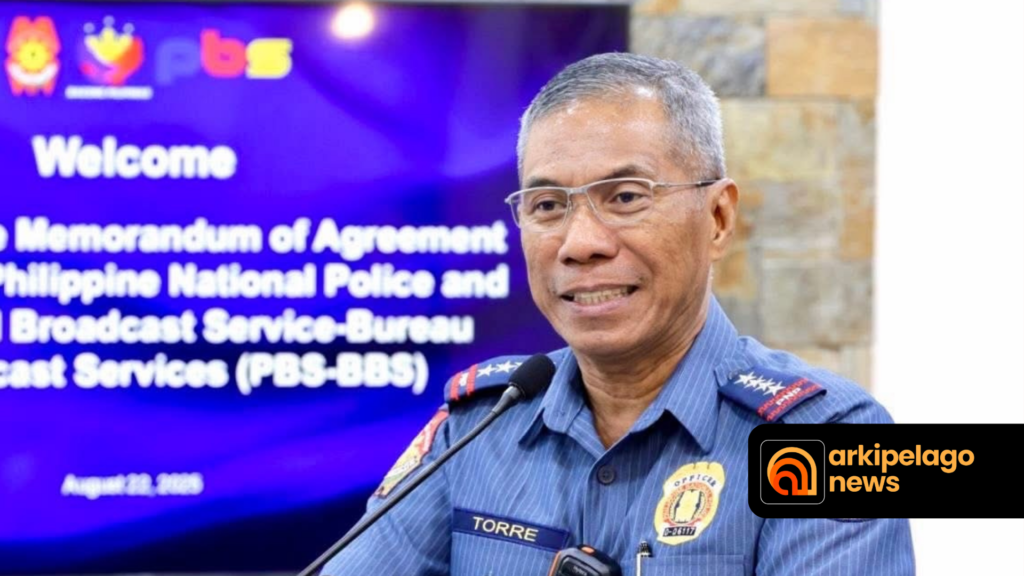Why Torre Was Removed: Power Struggles and Clashes Over Police Leadership
Paulo Gaborni August 26, 2025 at 09:22 PM
MANILA — Malacañang has relieved Philippine National Police (PNP) Chief Gen. Nicolas Torre III of his post, less than three months after his appointment.
“You are hereby relieved as Chief, PNP effective immediately. For the continuous and efficient delivery of public services in the PNP, you are hereby directed to ensure proper turnover of all matters, documents, and information relative to your office,” read a Palace memorandum signed by Executive Secretary Lucas Bersamin dated August 25.
No reason was cited in the document for Torre’s sudden removal.
Police Lt. Gen. Jose Nartatez Jr., Deputy Chief for Administration, has been designated as the new PNP Chief.
A Controversial Reshuffle and Power Struggle
Torre, appointed as PNP Chief on June 2, sparked controversy earlier this month when he unilaterally reassigned then–Deputy Chief for Administration Lt. Gen. Jose Melencio Nartatez Jr. to Western Mindanao and promoted Lt. Gen. Bernard Banac to the organization’s second-highest post.
Both Nartatez and Banac belong to the PMA “Tanglaw-Diwa” Class of 1992.
Napolcom immediately issued Resolution 2025-0531, directing Torre to reverse the changes, citing rules that require third-level appointments to be approved by the commission. Torre refused to comply.
Observers said the standoff revealed a deeper struggle over authority within the PNP. While the President has the power to appoint the police chief, oversight and operational supervision fall under the Department of the Interior and Local Government (DILG) and the National Police Commission (NAPOLCOM). Torre’s defiance was widely interpreted as a direct challenge to both institutions.
Torre’s public stance intensified tensions. During a flag-raising ceremony at Camp Crame on August 18, he introduced Banac in his new role and dismissed the dispute as “an administrative matter,” telling officers: “The PNP is united. No order, no obstacle, and no challenge can destroy our unity and our commitment to the nation.” The statement was read by many as a pointed rebuke of Napolcom’s authority.
However, Torre stated that the rift between the PNP and Napolcom was “resolved internally.”
“Siyempre ano pa. It is a simple case of dialogue and paliwanagan and you know pare-pareho naman tayong mga—at iisa ang ating purpose, iisa ang ating layunin dito, iisa ang pag-iisip natin at direksyon. So it is all for the good of the Filipino people. So ganun lang,” Torre explained. “Internal na nga, tapos na nga eh. Kung ano man naging epekto, pabayaan niyo na. So I would like to believe na ito ay okay na. Natuldukan na ito at sana because there is already a resolution and already final directive on what to do. So tapos na ito.”
Accumulating Frustration from the DILG
Interior Secretary Jonvic Remulla, who also serves as a Napolcom commissioner, voiced growing concern over Torre, stressing the importance of institutional authority and adherence to the rule of law.
Through Resolution 2025-0531, Napolcom nullified the PNP Chief’s reassignment orders, citing its legal authority to review, reverse, or modify third-level PNP appointments.
According to the resolution: “While the powers to designate, assign, reassign Police Commissioned Officers to third-level positions are vested in the Chief, PNP under Section 26 of R.A. No. 6975, the power to review, approve, reverse or modify such acts is within the authority of the NAPOLCOM.”
Remulla said he tried to reach Torre repeatedly—calling him five times the night before and several more times the following morning—but the former PNP Chief never answered.
The secretary later told reporters that the President weighed this issue carefully: “That, among other things, is part of the consideration of the President.”
He emphasized that the decision was ultimately Malacañang’s call, not a Napolcom sanction: “There is no sanction. The Napolcom has not taken any sanctions as a body, nor has it been discussed, nor has it been filed. This is a personal decision of the President.”
Torre Went Beyond Authority?
According to Senator Panfilo Lacson, a former PNP Chief, Torre’s unilateral relief of Nartatez was “beyond his authority.”
Lacson noted that designations and removals within the PNP Command Group should be cleared either with the President or, at minimum, the ex-officio chairman of Napolcom.
“Having said that, the relief of P/Gen. Torre is the sole prerogative of the President of the Philippines,” Lacson said.
“What is important at this point is a smooth transition and transfer of command and authority so as not to hamper the overall mission of the PNP to continue maintaining peace and order for the benefit of the people whom they have sworn to ‘serve and protect’,” he stressed.
A Short but Turbulent Tenure
Though brief—less than three months since replacing Gen. Benjamin Marbil on June 2—Torre’s tenure was marked by aggressive reforms.
He imposed a five-minute response time for Metro Manila patrol units, dismissed 19 officers for misconduct, sacked eight police chiefs for poor performance, and intensified the PNP’s internal cleansing campaign.
He also held the distinction of being the first graduate of the Philippine National Police Academy to rise to the organization’s top post.
📷 PNP
